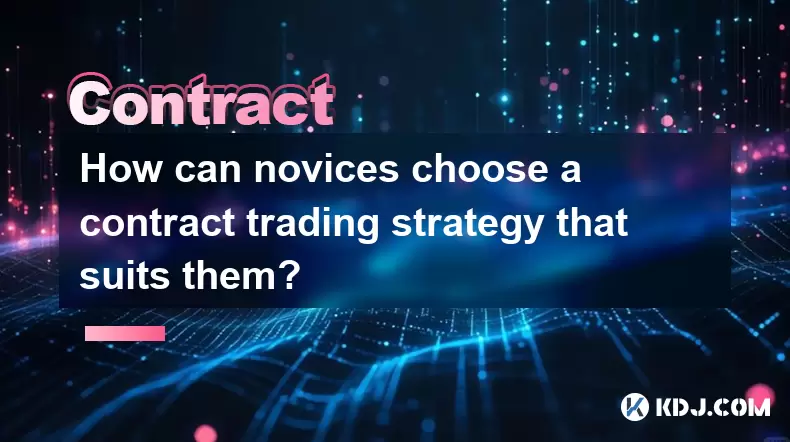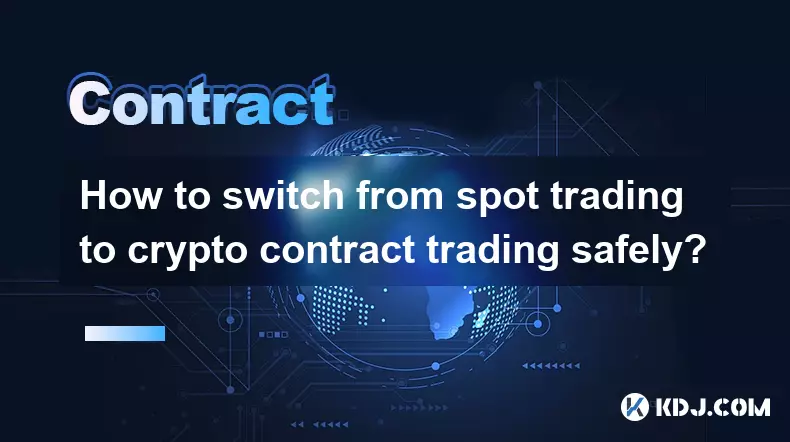-
 bitcoin
bitcoin $87959.907984 USD
1.34% -
 ethereum
ethereum $2920.497338 USD
3.04% -
 tether
tether $0.999775 USD
0.00% -
 xrp
xrp $2.237324 USD
8.12% -
 bnb
bnb $860.243768 USD
0.90% -
 solana
solana $138.089498 USD
5.43% -
 usd-coin
usd-coin $0.999807 USD
0.01% -
 tron
tron $0.272801 USD
-1.53% -
 dogecoin
dogecoin $0.150904 USD
2.96% -
 cardano
cardano $0.421635 USD
1.97% -
 hyperliquid
hyperliquid $32.152445 USD
2.23% -
 bitcoin-cash
bitcoin-cash $533.301069 USD
-1.94% -
 chainlink
chainlink $12.953417 USD
2.68% -
 unus-sed-leo
unus-sed-leo $9.535951 USD
0.73% -
 zcash
zcash $521.483386 USD
-2.87%
How can novices choose a contract trading strategy that suits them?
Beginner contract traders should start with low leverage, focus on risk management, and practice strategies like trend following or range trading to build experience.
Jun 19, 2025 at 07:42 pm

Understanding Contract Trading
Contract trading, also known as futures trading, involves speculating on the price movements of cryptocurrencies without owning the underlying asset. This type of trading allows users to go long (buy) or short (sell) based on their market predictions. For beginners, understanding the mechanics of leverage, liquidation prices, and funding fees is essential before diving into any strategy.
Novices must recognize that contract trading differs significantly from spot trading. It introduces additional risks due to leverage, which can amplify both gains and losses. Therefore, choosing a suitable strategy requires not only technical knowledge but also emotional discipline and risk management skills.
Evaluating Risk Tolerance and Capital Allocation
Before selecting a strategy, it's crucial to assess your risk tolerance level and determine how much capital you're willing to allocate for contract trading. Beginners often make the mistake of risking too much on a single trade, which can lead to rapid account depletion.
- Determine your maximum acceptable loss per trade
- Set aside a dedicated fund strictly for futures trading
- Avoid using borrowed funds or money intended for daily expenses
A recommended approach is to start with small position sizes and gradually increase exposure as experience grows. Using stop-loss orders can help control downside risk effectively.
Exploring Common Trading Strategies for Novices
There are several beginner-friendly strategies that align well with varying market conditions and personal preferences:
- Trend following: Involves identifying and riding existing market trends using moving averages or trendlines
- Range trading: Focuses on buying at support levels and selling at resistance levels in sideways markets
- Scalping: A short-term strategy aiming to capture small price movements multiple times a day
- News-based trading: Reacting quickly to major announcements or events affecting crypto prices
Each strategy has its own set of rules, time commitments, and psychological demands. It's important to backtest each one using historical data or demo accounts before committing real funds.
Choosing the Right Tools and Platforms
Selecting a reliable and user-friendly trading platform is critical for executing your chosen strategy effectively. Look for platforms that offer:
- Clear charting tools with technical indicators like RSI, MACD, and Bollinger Bands
- Low-latency execution to minimize slippage
- Risk management features such as stop-loss and take-profit options
- Educational resources tailored for beginners
Additionally, ensure the platform supports paper trading or demo mode so you can practice without financial risk. Some platforms also provide copy trading features where novices can follow experienced traders' positions.
Developing Discipline and Emotional Control
One of the most overlooked aspects of successful contract trading is emotional discipline. Fear and greed can easily cloud judgment, leading to impulsive decisions. Establishing a trading plan and sticking to it helps mitigate emotional interference.
- Define clear entry and exit rules
- Keep a trade journal to track performance and identify patterns
- Review mistakes regularly to avoid repeating them
Discipline also includes knowing when to take breaks and not over-trade. Over-engagement often leads to fatigue and poor decision-making.
Frequently Asked Questions
Q: Can I start contract trading with a small budget?Yes, many platforms allow users to trade with small amounts by offering low minimum margin requirements. However, it’s important to manage leverage carefully and avoid overexposure.
Q: Is it better to use high or low leverage as a beginner?Beginners should stick to low leverage (e.g., 2x–5x) to reduce the risk of liquidation. High leverage increases potential profits but also significantly raises the chance of losing capital quickly.
Q: How do I know if a strategy fits my lifestyle?Consider how much time you can dedicate to monitoring the market. Scalping and news-based trading require constant attention, while trend following can be more flexible with periodic checks.
Q: What are funding fees in contract trading?Funding fees are periodic payments made between long and short traders depending on the prevailing interest rate differential. These fees are usually small but can accumulate over time, especially in perpetual contracts.
Disclaimer:info@kdj.com
The information provided is not trading advice. kdj.com does not assume any responsibility for any investments made based on the information provided in this article. Cryptocurrencies are highly volatile and it is highly recommended that you invest with caution after thorough research!
If you believe that the content used on this website infringes your copyright, please contact us immediately (info@kdj.com) and we will delete it promptly.
- Bitcoin Faces Identity Crisis as Speculators Flock to Prediction Markets and Ultra-Short Options
- 2026-02-02 00:30:06
- MGK and Jelly Roll Honor Ozzy Osbourne at Pre-Grammy Gala, Sparking Fan Frenzy
- 2026-02-02 00:50:02
- Super Bowl Coin Flip: Unpacking the Prediction Power of Heads or Tails
- 2026-02-02 01:30:01
- Litecoin Price Cracks 9-Year Floor Amidst Market Breakdown: What's Next for the OG Crypto?
- 2026-02-02 01:20:02
- Crypto News, Cryptocurrency Markets, Latest Updates: A Topsy-Turvy Start to 2026
- 2026-02-02 01:15:01
- New York Minute: LivLive Presale Ignites, While Solana Navigates Choppy Waters
- 2026-02-02 01:15:01
Related knowledge

How to close a crypto contract position manually or automatically?
Feb 01,2026 at 11:19pm
Manual Position Closure Process1. Log into the trading platform where the contract is active and navigate to the 'Positions' or 'Open Orders' tab. 2. ...

How to understand the impact of Bitcoin ETFs on crypto contracts?
Feb 01,2026 at 04:19pm
Bitcoin ETFs and Market Liquidity1. Bitcoin ETFs introduce institutional capital directly into the spot market, increasing order book depth and reduci...

How to trade DeFi contracts during the current liquidity surge?
Feb 01,2026 at 07:00am
Understanding Liquidity Dynamics in DeFi Protocols1. Liquidity surges in DeFi are often triggered by coordinated capital inflows from yield farming in...

How to trade micro-cap crypto contracts with high growth potential?
Feb 01,2026 at 02:20pm
Understanding Micro-Cap Crypto Contracts1. Micro-cap crypto contracts refer to derivative instruments tied to tokens with market capitalizations under...

How to optimize your workspace for professional crypto contract trading?
Feb 01,2026 at 08:20pm
Hardware Infrastructure Requirements1. High-frequency crypto contract trading demands ultra-low latency execution. A dedicated workstation with a mini...

How to switch from spot trading to crypto contract trading safely?
Feb 01,2026 at 03:59pm
Understanding the Core Differences Between Spot and Contract Trading1. Spot trading involves the immediate exchange of cryptocurrencies for fiat or ot...

How to close a crypto contract position manually or automatically?
Feb 01,2026 at 11:19pm
Manual Position Closure Process1. Log into the trading platform where the contract is active and navigate to the 'Positions' or 'Open Orders' tab. 2. ...

How to understand the impact of Bitcoin ETFs on crypto contracts?
Feb 01,2026 at 04:19pm
Bitcoin ETFs and Market Liquidity1. Bitcoin ETFs introduce institutional capital directly into the spot market, increasing order book depth and reduci...

How to trade DeFi contracts during the current liquidity surge?
Feb 01,2026 at 07:00am
Understanding Liquidity Dynamics in DeFi Protocols1. Liquidity surges in DeFi are often triggered by coordinated capital inflows from yield farming in...

How to trade micro-cap crypto contracts with high growth potential?
Feb 01,2026 at 02:20pm
Understanding Micro-Cap Crypto Contracts1. Micro-cap crypto contracts refer to derivative instruments tied to tokens with market capitalizations under...

How to optimize your workspace for professional crypto contract trading?
Feb 01,2026 at 08:20pm
Hardware Infrastructure Requirements1. High-frequency crypto contract trading demands ultra-low latency execution. A dedicated workstation with a mini...

How to switch from spot trading to crypto contract trading safely?
Feb 01,2026 at 03:59pm
Understanding the Core Differences Between Spot and Contract Trading1. Spot trading involves the immediate exchange of cryptocurrencies for fiat or ot...
See all articles










































































